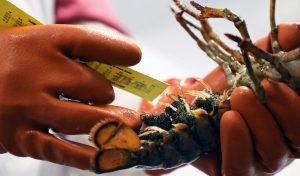Search results for: Volaris Airlines 1800-299-7264 Reservations
DunesRestoration-FINAL_87224
DunesRestoration-FINAL_87224
Read MoreBulletin: Coastal Dune Protection & Restoration
Bulletin: Coastal Dune Protection & Restoration This bulletin addresses restoration of the dynamic frontal coastal sand dune system with sand fencing and ‘Cape’ American beachgrass. Other typical Northeast area dune plants, such as Rosa Rugosa, Bayberry, and Beach Plum occupy more stable secondary and backdune areas.
Read MoreTheme Booklet: Environmental Technologies
Theme Booklet: Environmental Technologies WHOI Sea Grant 4 pp., 2000 WHOI-G-00-006 Also available online: click here Learn more of WHOI Sea Grant’s investment in environmental technologies which has resulted in the development of new tools for analyzing and interpreting the effects of toxic chemicals on the reproduction, development, and disease defenses in marine animals and…
Read MoreResearch into American Lobster Reproduction
A New Interactive StoryMap Highlights Projects from the Sea Grant American Lobster Initiative A new web-based StoryMap highlights research being conducted by scientists into the reproduction of the American lobster. The scientific studies and the work to communicate about them are part of the American Lobster Initiative of the National Oceanic and Atmospheric Administration’s National…
Read MoreGraduate Research Fellows Focus on Microplastics and Seabirds
Woods Hole and MIT Sea Grant Programs Announce Two New Massachusetts Sea Grant Graduate Research Fellows August 8, 2022 — Last August, the Woods Hole and MIT Sea Grant programs announced a new joint fellowship program to support Massachusetts graduate students engaging in coastal and marine research. Two students have now been selected as…
Read MoreSalt Marshes: Biological Controls of Food Webs in a Diminishing Environment
Salt Marshes: Biological Controls of Food Webs in a Diminishing Environment Valiela, I., D. Rutecki, and S. Fox Journal of Experimental Marine Biology and Ecology, Vol. 300, pp. 131-159, 2004 WHOI-R-04-003
Read More1990-2000 Environmental Technologies Summary
Snapshot WHOI Sea Grant’s investment in environmental technologies has resulted in the development of new tools for analyzing and interpreting the effects of toxic chemicals on the reproduction, development, and disease defenses in marine animals and for detecting the presence of harmful algal species before bloom conditions occur. Background Coastal ecosystems in southeastern Massachusetts are…
Read MoreOsmium Isotopes and Silver as Tracers of Anthropogenic Metals in Sediments from Massachusetts and Cape Cod Bays
Osmium Isotopes and Silver as Tracers of Anthropogenic Metals in Sediments from Massachusetts and Cape Cod Bays Ravizza, G.E. and M.H. Bothner Geochimica et Cosmochimica Acta, Vol. 60, No. 15, pp. 2753-2763, 1996 WHOI-R-96-009
Read More2006-2008 Projects
Are Humans and Recovering Fish Stocks Targeting the Same Squid Prey? Fishing pressure on squid has increased worldwide as other fish stocks have been depleted and fisheries target species lower on the food chain. Yet squid are preferred prey for many marine fish and mammals. Overexploitation of squid, wrote Francis Juanes of the University of…
Read More

